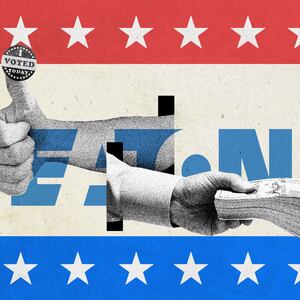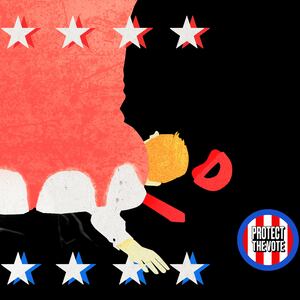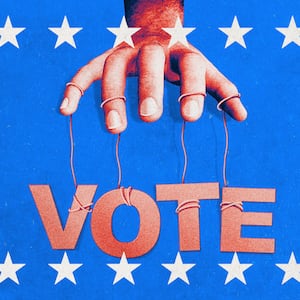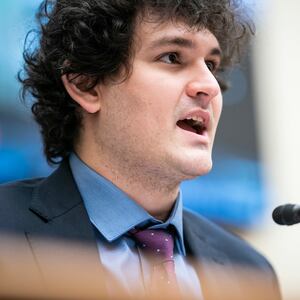A ballot initiative that could change the way Seattle chooses its city officials has pitted two unconventional voting methods against each other, with one side attracting hundreds of thousands in funding from a crypto billionaire and other Silicon Valley denizens.
But in a city known as a progressive bastion, critics wonder if the change is even necessary and if activists are tinkering with the city’s voting system just because of Seattle’s receptiveness to change.
“Our electorate is very, very progressive and I think are very much primed to have almost a Pavlovian positive response when people say election reform,” said Sandeep Kaushik, a Seattle-based public affairs and political consultant who has been openly opposed to the reform efforts.
ADVERTISEMENT
Washington, by law, has an open, non-partisan primary that ultimately results in a two candidate run-off in the general election. Currently, Seattle voters pick the single candidate they want to win in the primary and again in the general election.
The text of the initiative posted on King County’s website, first asks the voter whether either of the two proposals, dubbed 1A and 1B, should be enacted. The second question instructs the voter to pick which initiative they like better “regardless of whether you voted yes or no” on the first question.
On one side of the debate to change that system is Approval Voting, a method that allows individuals to choose as many candidates as they’d like on a ballot. Proponents say Approval Voting’s attributes include the elimination of “strategic voting,” as well as mistakes that result in ballots being thrown out. The top two choices simply go to a runoff.
On the other side is Ranked Choice Voting (RCV) where—as the name suggests—voters rank their choices first, second and so on. If no candidate gets a majority, and a voter’s top choice falls short and is eliminated, then their second choice is counted. This, too, would ultimately result in a two candidate run-off in compliance with Washington State law.
The ballot initiative is being considered as voting rules around the country are being changed to either expand or contract rights, depending largely on which party is in power at the state level.
“It’s a little unclear what problem we’re solving,” said one community leader with knowledge of the issue, who was not authorized to speak on the record. “Is there dissatisfaction with our local election process? There wasn’t until we needed to decide whether we wanted election reform.”
Advocates disagree, pointing to the number of candidates who have campaigned in recent local elections as a prime example of why change is needed, particularly when it comes to voters who want to pick a less popular candidate, but feel like they might be throwing their vote away if they do.
“The trouble with Seattle’s system right now is that voters are forced to vote strategically, and winners often advance without real, broad support,” said Stephanie Houghton, FairVote Washington’s Managing Director. “Ranked-choice voting means you don’t get stuck having to choose between the lesser of two evils.”
Troy Davis, a tech entrepreneur and co-leader of the SeattleApproves campaign—the other side of the debate—agreed that the need to select just one candidate has limited voter engagement.
“We talked with thousands of Seattle voters and heard that over and over,” Davis said. “Those voters end up voting based on how they think other people will vote, not based on their own preferences.”
Their agreement stops there, though, as the two sides are quick to point out the flaws in the other method’s approach.
The rivalry started late last year, when proponents of Approval Voting launched a signature campaign in Seattle to get the method to qualify for the ballot.
The effort was well-funded, raising a total of $489,483 as of Oct. 12. Samuel Bankman-Fried, a crypto billionaire who has given millions to Democrats and their causes over the past year alone, is one of the latest donors, giving $135,000 in February 2022 to the cause. The Center for Election Science, a California-based think tank financed by charitable donations that are obscured through a middle-man organization, provided a grant of $211,362. Most of the funds were aimed at gathering signatures for the ballot, Davis confirmed.
Nick Beckstead, president of Bankman-Fried’s FTX Foundation, said the funding was part of their support of “protecting democratic discourse, deliberation, and efforts to safeguard the political process, including alternative voting systems.”
“More widespread adoption of Approval Voting would give voters more power to express their preferences, which could reduce polarization and strengthen democracy,” he said.
Approval Voting was adopted by voters in local elections in two cities in recent years: Fargo, ND and St. Louis, MO. Both of those initiatives also received hefty donations from the Center for Election Science, according to the group’s tax documents.
Once the Approval Voting initiative qualified for the ballot in Seattle, a second electoral reform group, with deep roots in the area, lobbied to be listed as an alternative to the Approval Voting measure. The city council approved the addition of RCV to the ballot.
That was a move, according to Davis, to protect the status quo.
“As you’d imagine, political groups (and incumbents!) are certainly eager to protect their power,” he wrote in an email, pointing to the speed at which the city council moved to add the measure. “No Council business passes in 48 hours. Elections deserve more thought—and Seattle voters more transparency—than that.”
RCV advocates contend their method was more suited to the community where they had been working in the community for years and pointed to the number of local endorsements from unions and community groups as well as in-state financial support.
Additionally, Rob Richie, President and CEO of FairVote and FairVote Action, charged that Approval Voting system had the potential to create “a lot of extra power for an older, whiter, wealthier primary electorate, which now has extra power to lock out any minority perspective from the more representative electorate one sees in general elections.”
But Aaron Hamlin, the executive director of Center for Election Science, said their decades-long effort was telling.
“That some local groups have been pushing for RCV for decades is indicative of how ineffectual that effort has been,” he said, pointing to the fact RCV was adopted in nearby Pierce County, Washington and repealed shortly thereafter.
Asked about the Pierce County repeal, Houghton called the criticism “two decades behind the times.”
“RCV is tested and proven in over 50 places across the U.S. right now,” she said, adding that RCV is on ballots in three places in Washington State.
“We know that from Alaska to New York, voters have found RCV simple to use,” Houghten said. “We aren’t reinventing the wheel.”
Still, for residents like Kaushik, the changes, as well-intentioned as their supporters claim to be, don’t make sense in a place where a diverse group of candidates routinely run and are elected.
“Genuinely, I’m mystified,” Kaushik said. “We’re progressive electorate [and] yeah, we’re a majority white city. We have no problem, in Seattle, electing minority candidates or women to elective office.”
“I just think these are solutions in search of problems,” he said.
Additional reporting from Emily Shugerman









